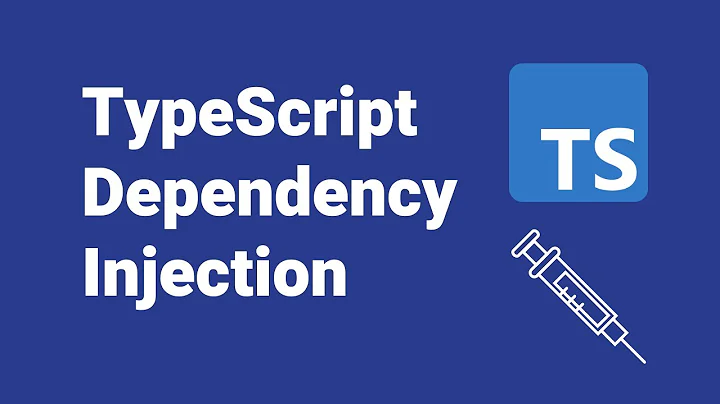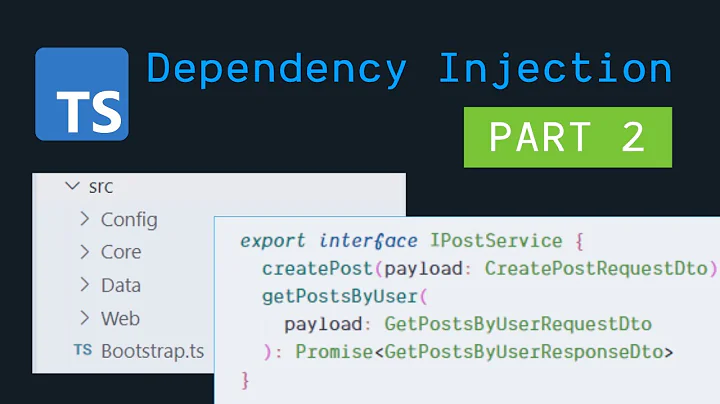Angular service in typescript with dependency injection and minification
Just using the $inject syntax. e.g. :
class Service
{
static $inject = ['$http'];
constructor( private $http: ng.IHttpService )
{
}
public MyMethod()
{
this.$http.get( "/" )
.success( null )
.error( null );
}
}
PS: I did a detailed video on the subject : http://www.youtube.com/watch?v=WdtVn_8K17E&hd=1
Related videos on Youtube
Comments
-
 Dreamwalker about 1 year
Dreamwalker about 1 yearI am trying to get my head round angularjs at the moment. I am currently looking at services I am also using typescript for code.
Now from samples on the web I have seen that people use something like below for a service in typescript.
class Service { constructor( private $http: ng.IHttpService ) { } public MyMethod() { this.$http.get( "/" ) .success( null ) .error( null ); } }Now if this is minified I would lose
$httpfrom the constructor and angular requires the variable names. So I checked around and found I can use $inject instead of the constructor but this also would get the same minification problem.How are people dealing with minification and angular in a typescript context? I am struggling to find some solid docs on how this should be handled. To me this seems odd to have these problems in a modern api so I must be missing something somewhere.
-
 ekussbergYou can use before uglifyid the "ngAnnotate" module for gulp, so it will prevent loosing of dependencies in angular. For example: gulp.src(paths.ts).pipe(ts(ts.createProject('tsconfig.json'))).pipe(concat('app.min.js')).pipe(ngAnnotate({remove: true,add: true,single_quotes: true })).pipe(uglify()).pipe(gulp.dest('www/js/'))
ekussbergYou can use before uglifyid the "ngAnnotate" module for gulp, so it will prevent loosing of dependencies in angular. For example: gulp.src(paths.ts).pipe(ts(ts.createProject('tsconfig.json'))).pipe(concat('app.min.js')).pipe(ngAnnotate({remove: true,add: true,single_quotes: true })).pipe(uglify()).pipe(gulp.dest('www/js/'))
-
-
 mhelvens over 9 yearsBut this way, each
mhelvens over 9 yearsBut this way, eachServiceinstance gets its own$httpreference. In vanilla JavaScript, theangular.factorymethod is commonly used to access such dependencies in a closure. What best practices would you suggest to achieve this in Typescript? -
 basarat over 9 yearsServices are singletons. There will be only one instance
basarat over 9 yearsServices are singletons. There will be only one instance -
 mhelvens over 9 yearsJavascript doesn't know about classes (or singletons), and so neither does AngularJS. Services can be anything. I've been offering instantiable 'classes' as services for ages.
mhelvens over 9 yearsJavascript doesn't know about classes (or singletons), and so neither does AngularJS. Services can be anything. I've been offering instantiable 'classes' as services for ages. -
 Trevor over 8 yearsYes, but AngularJS will do the instantiating and inject the same instance wherever it is requested.
Trevor over 8 yearsYes, but AngularJS will do the instantiating and inject the same instance wherever it is requested.










![[100daysOfAngular] Day 15 - Basic Dependency Injection (Vietnamese)](vi/_JnUGhVhq_o/hq720_sqp--oaymwEcCNAFEJQDSFXyq4qpAw4IARUAAIhCGAFwAcABBg---rs-AOn4CLDLCvTWqpnXICvG_OOyG8d_LXcgpA.jpg)
